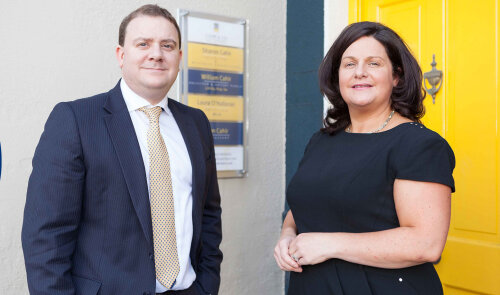Best Workers Compensation Lawyers in Ennis
Share your needs with us, get contacted by law firms.
Free. Takes 2 min.
List of the best lawyers in Ennis, Ireland
About Workers Compensation Law in Ennis, Ireland
In Ireland the term "workers compensation" is not used in the same statutory way as in some other countries. If you are injured at work in Ennis you will typically rely on a combination of systems - civil personal injury law to seek damages from an employer or third party, employer liability insurance, social-welfare payments for loss of earnings, and regulatory enforcement by the Health and Safety Authority. Workplace injuries are therefore dealt with through personal injury claims, the Personal Injuries Assessment Board process, potential court proceedings, and statutory social-welfare supports. Understanding how these pieces fit together is the first step in protecting your rights.
Why You May Need a Lawyer
Many workplace injury situations benefit from legal advice. A solicitor can help when your case involves disputed liability, significant or long-term injuries, loss of earnings, occupational disease, or complex medical causation. Lawyers can:
- Explain your legal options and likely outcomes.
- Advise on whether to use the Personal Injuries Assessment Board or issue court proceedings.
- Collect and present medical evidence, witness statements, and records.
- Negotiate with insurers and employers to secure fair compensation.
- Protect you against procedural pitfalls such as missing limitation periods and complying with required notices.
If an employer admits liability and offers a straightforward settlement you may need less legal help. If liability is denied, the injuries are serious, or future care and loss of earnings must be calculated, legal representation is strongly recommended.
Local Laws Overview
Key legal and regulatory aspects relevant in Ennis include:
- Employer duties - Under the Safety, Health and Welfare at Work Act 2005 employers must provide a safe workplace, appropriate training, and protective equipment. Failure can lead to prosecution by the Health and Safety Authority and form the basis for a civil claim.
- Employers' liability insurance - Most employers carry liability insurance to cover compensation claims for workplace injuries. Insurance companies often handle claims on the employer's behalf.
- Personal injury claim process - Most workplace injury claims are routed through the Personal Injuries Assessment Board for an independent assessment before court proceedings are issued. You may accept the PIAB recommendation or proceed to court if you reject it.
- Limitation periods - Time limits to bring a claim are strict. Generally you must start a legal action within two years from the date of the injury or from the date you became aware that the injury was linked to work. There are limited exceptions, so early legal advice is important.
- Social-welfare supports - If you cannot work because of injury you may be eligible for social-welfare payments such as Illness Benefit, subject to PRSI contribution conditions. These provide short-term income support but do not replace a civil damages claim.
- Occupational disease and gradual injuries - Conditions that develop over time, for example hearing loss or repetitive strain injuries, can be compensable but causation and timing rules are often more complicated.
- Workplace disputes and dismissal - If you are disciplined or dismissed after reporting an injury, you may have separate employment law claims such as unfair dismissal or constructive dismissal, which are handled by the Workplace Relations Commission.
Frequently Asked Questions
What should I do immediately after a workplace injury?
Seek medical attention first. Report the injury to your employer as soon as possible and request that it be recorded in the accident book. Take photographs of the scene and your injury if possible. Collect contact details for any witnesses. Preserve medical records and keep a diary of symptoms and treatment.
Can I be compensated if my employer admits no fault?
Yes. Even if an employer denies fault, you may have a valid claim. Many cases turn on evidence about safety procedures, training, supervision, and equipment. A solicitor can assess liability and advise whether to pursue a PIAB application or court action.
How long do I have to make a claim?
Time limits are strict. Generally you must issue proceedings within two years from the date of the injury or from the date you knew the injury was work-related. For occupational diseases the limitation date may be the date of knowledge. Always seek advice promptly to avoid losing rights.
What is the Personal Injuries Assessment Board - PIAB?
PIAB is a statutory body that assesses personal injury claims and issues an assessment of a fair award based on medical and factual material. Many workplace injury claims go through PIAB before court proceedings can be issued. You may accept PIAB's recommendation or reject it and proceed to the courts.
Will social-welfare payments affect my compensation?
Social-welfare benefits such as Illness Benefit provide short-term income support and are separate from civil claims. Some benefits or payments from an employer may be taken into account when calculating damages, but this is a technical area. A lawyer can explain how any payments you have received may interact with a damages claim.
Can I get legal aid for a workplace injury claim?
Civil legal aid is limited and eligibility depends on financial means and the merits of the case. Many solicitors in Ireland also offer conditional fee agreements or fee structures that make legal help accessible. Discuss funding options at your first meeting with a solicitor.
What evidence will help my case?
Key evidence includes medical reports and test results, employer accident reports, photographic or video evidence of the scene, witness statements, payslips and records of lost earnings, correspondence with your employer or insurer, and a personal diary of how the injury affects daily life.
What if my injury is from a third party at work?
If a third party is responsible - for example a contractor, vehicle driver, or supplier - you may have a claim against that party as well as or instead of your employer. Third-party claims can sometimes be more straightforward because there is no employer immunity issue. A solicitor will consider all potential defendants.
How is compensation calculated?
Compensation covers general damages for pain and suffering and special damages for financial losses such as loss of earnings, medical costs, rehabilitation, and future care needs. The amount depends on the severity and prognosis of the injury, medical evidence, and financial impact. Calculating future losses often requires expert reports.
Do I need a local solicitor in Ennis or can I use one from elsewhere?
You can instruct a solicitor based anywhere in Ireland, but a local solicitor in Ennis or County Clare may be convenient for meetings, obtaining local witness statements, and knowledge of local medical providers. Choose a solicitor with experience in workplace injury and PIAB procedures.
Additional Resources
Useful organisations and bodies to contact or consult for information and assistance include:
- Health and Safety Authority - enforces workplace safety standards and investigates serious accidents.
- Personal Injuries Assessment Board - handles statutory assessment of personal injury claims.
- Workplace Relations Commission - deals with employment disputes and unfair dismissal claims.
- Department of Social Protection - administers Illness Benefit and other social-welfare supports.
- Citizens Information - provides guidance on legal rights, welfare entitlements, and local services.
- Legal Aid Board - information on eligibility for civil legal aid.
- Trade unions and employee representative bodies - can offer support, representation, and advice in workplace disputes.
- Local solicitors specialising in personal injury and employment law - for tailored legal advice and representation.
Next Steps
If you need legal assistance for a workplace injury in Ennis follow these steps:
- Get immediate medical attention and keep all medical records.
- Report the injury to your employer and ensure it is recorded.
- Preserve evidence - photos, witness details, accident reports, payslips, and correspondence.
- Note important dates - date of injury, dates of medical visits, and any communication with employer or insurer.
- Contact a solicitor experienced in workplace injury and PIAB claims for an early assessment. Ask about fee arrangements, time limits, and likely outcomes.
- If you cannot afford private fees, check eligibility for civil legal aid or ask about conditional fee arrangements.
- Consider notifying PIAB if a civil claim is appropriate, but take legal advice first so you understand the consequences and deadlines.
Early action preserves your rights and improves the chance of a fair outcome. A solicitor will guide you through the PIAB process or court proceedings, negotiate with insurers, and help quantify losses so you can focus on recovery.
Lawzana helps you find the best lawyers and law firms in Ennis through a curated and pre-screened list of qualified legal professionals. Our platform offers rankings and detailed profiles of attorneys and law firms, allowing you to compare based on practice areas, including Workers Compensation, experience, and client feedback.
Each profile includes a description of the firm's areas of practice, client reviews, team members and partners, year of establishment, spoken languages, office locations, contact information, social media presence, and any published articles or resources. Most firms on our platform speak English and are experienced in both local and international legal matters.
Get a quote from top-rated law firms in Ennis, Ireland — quickly, securely, and without unnecessary hassle.
Disclaimer:
The information provided on this page is for general informational purposes only and does not constitute legal advice. While we strive to ensure the accuracy and relevance of the content, legal information may change over time, and interpretations of the law can vary. You should always consult with a qualified legal professional for advice specific to your situation.
We disclaim all liability for actions taken or not taken based on the content of this page. If you believe any information is incorrect or outdated, please contact us, and we will review and update it where appropriate.










